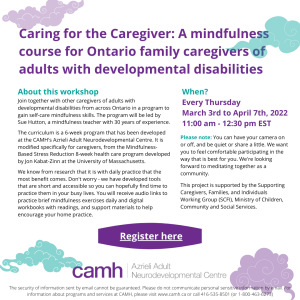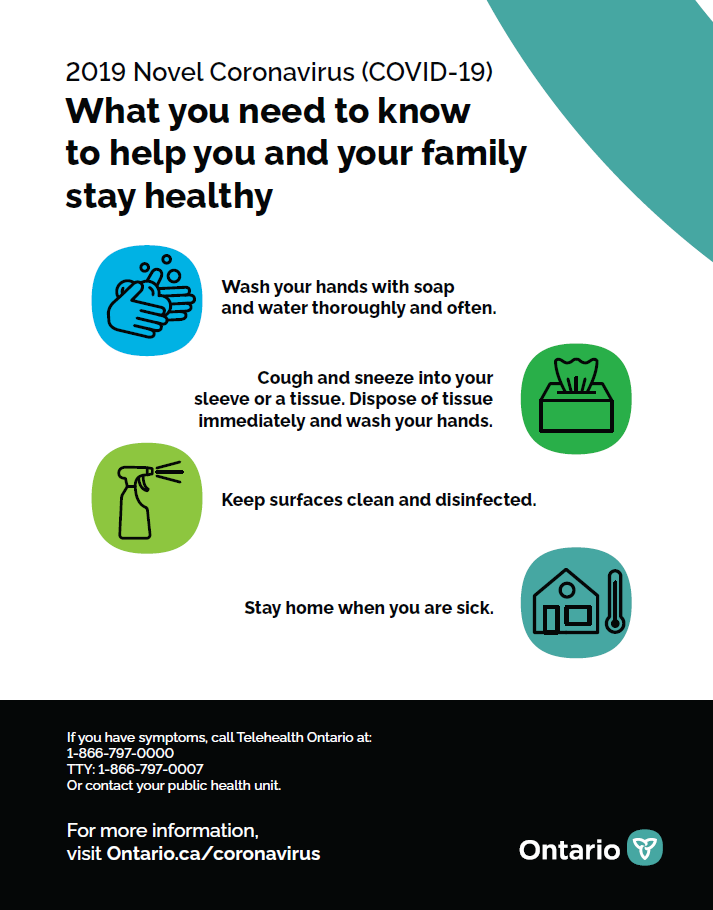
Mental health for adults with developmental disabilities during COVID: A virtual course for family caregivers

Caring for the caregiver: A mindfulness course for Ontario family caregivers of adults with developmental disabilities


The complementary nature of the collaboration between Holland Bloorview and SickKids means more choice for children and youth with medical complexity and developmental conditions, and their families, in the following ways:
· Booking an appointment by calling one central number: 416-419-4623. The line is open from 8 a.m. to 8 p.m. seven days a week, staffed by Holland Bloorview and SickKids staff.
· The option for testing at a downtown (SickKids) location during daytime hours (Monday to Friday and Sunday, 8 a.m. to 4 p.m.) or uptown (Holland Bloorview) location during some evening hours (Monday and Wednesday, 5 p.m. to 9 p.m.) and Saturdays, 8 a.m. to 4 p.m.
· Having the testing swab taken inside the vehicle or tent outside (SickKids) or in an indoor setting (Holland Bloorview).
This school year has brought a whole host of new challenges and experiences for students, parents and teachers alike. Students with ASD at all levels are having to adapt to the new academic landscape due to changes brought about by COVID-19. It is important to understand how these developments are impacting students’ learning and social and emotional wellbeing.
What follows are some of the benefits and challenges students with ASD are reporting across all levels of schooling, and some strategies for success during the time of COVID-19.
Elementary School:
In-person:
Online Learning:
High School:
Post-Secondary Online Learning:
I can wear a mask – A social Story by THE AUTISM RESEARCH INSTITUTE
I can wear a mask! – A Social Story for Visual Learners by Meg Stone
Heaberlin, PsyD & Celia Schloemer, MA, Cincinnati Children’s Hospital Medical Center
WEARING A MASK – ASERT & PAautism.org
Some children may feel uneasy about wearing masks. They may need extra support and comfort from parents. Parents also can help children understand why they might need to wear a mask, and make them more comfortable and even fun to wear.
There is currently no vaccine to prevent COVID-19. The best way to prevent infection is to avoid being exposed to this virus. Prevention measures include:

Workplace Safety & Prevention Services provides us with a video on mask basics as the world reopens.
The Centre for Addiction and Mental Health (CAMH) provides a number of resources and strategies on how to support your individual mental health, as well as that of love ones.
The Canadian Pediatric Society has some tips on taking care of kids’ mental health during the pandemic including:
Autism Focused Intervention Resources & Modules (AFIRM) has provided resources on how to support individuals with autism during uncertain times.
Columbia Engineering provides information on how coding combines elements of art and visual language to provide a helpful outlet for children in these uncertain times.
E. Jenner, K. Wilson, N. Roberts and A. Scheffler give us an illustrated book called Coronavirus: A Book for Children for kids aged 5 to 12 years. brings us a social distancing social story for the whole family.
MENTAL HEALTH RESOURCES: The new COVID-19 reality is difficult and weighs heavily on everyone’s mental health. Many of the strategies we use to maintain mental health are not available in the same ways as before. However, there are still many resources available to support mental health. Below please find a selection of web-based resources that might prove helpful for anyone who feels their mental health could use a boost right now:
Online magazine, Parade provides tips from Temple Grandin on how to help kids cope through self-isolation.
Rocky Mountain Autism Centre is hosting an ASD Webinar Series for Families and Professionals.
PopSugar brings us a social distancing social story for the whole family.
The Toronto Public Library has a number of read-along books for beginner readers and beyond.
Good E-reader provides us with a list of 100 free Sesame Street e-books available on Amazon Kindle, Apple Books, Barnes & Noble Nook, Google Play, and Kobo.
Oxford Owl has an e-book library (free with sign-in) for ages 3 to 11 years old.
Growing Healthy Children Therapy Services gives us a number of free Sensory Motor Activity Books for families and professionals to enjoy.
International Children’s Digital Library provides visitors with a collection of books in many different languages, including Farsi, Korean and Spanish.
Sportball is posting free virtual classes to their Facebook page every Wednesday and Friday.
Internet Archive has a collection of over 20,000,000 free e-books (sign-in required) for users to enjoy.
Sonshine and Broccoli are streaming live Monday through Friday at 11:30 am for all budding rock stars!
Vooks is a read-along resource with a number of animated storybooks. There is a paid subscription with a free one-month trial.
Epic gives you access to over 40,000 digital books. There is a paid subscription with a free one-month trial.
ISAND’s Occupational Therapist, Alyssa Johnston, provides a list of self-regulation, fine and gross motor strategies and resources.
The Ontario Ministry of Education has created a Learn at Home portal, providing supplementary resources for elementary and secondary students to practice math and literacy skills and learn at home.
Online games are a great way for us to stay social while social distancing.
TDSB has provided a list of Learning resources for Early years to Secondary-aged children to accompany their existing Virtual Library.
The Khan Academy has provided adaptable schedule templates to help keep things structured during these uncertain times.
IXL Online provides Language Arts and Math practice by grade level.
Audible.com is now allowing visitors to stream popular storybooks for free!
Toronto Public Library has a list of 38 ways to use the library from home!
SightWords provides tools to improve automatic recognition, spelling and fluency, by grade level.
Journal Buddies provides a list of free creative writing prompts for kids.
BBC Bitesize gives us a fun way to learn touch typing.
Hand in Hand Parenting provides timely resources and practical tools to help in your house now.
The Child Mind Institute is bringing families live Facebook chats, phone consultations as well as videos and articles on a range of topics from managing anxiety to managing self-care.
Harvard University’s Center of the Developing Child gives us age-specific activities to help those from infancy to adolescence enhance and practice executive function skills.
CTV News has provided us with a list of Museums, Galleries and other attractions that are providing virtual tours and attractions for families to enjoy during social distancing.
TVO Kids has a number of videos, games, apps for kids to enjoy.
WhatMomsLove provides a list of energy-burning activities to keep your kids moving!
Scholastic Canada has put together a Learn at Home series for kids ages Preschool to Grade 9.
Common Sense Media provides clarity on how to understand COVID-19 news coverage, separate the facts from the fiction and how to keep you and your family calm.
Autism Society of Newfoundland and Labrador provides a list of tools and resources to help you keep busy from home.
Alicia Trautwein presents a parent’s guide on how to manage the daily routine during quarantine.
Amanda McGuinness at TheAutismEducator has created this helpful social story to ‘help alleviate fears and anxiety many children may be experiencing at this time’.
Finally, Autism Ontario provides a list of additional resources to help families through COVID-19.